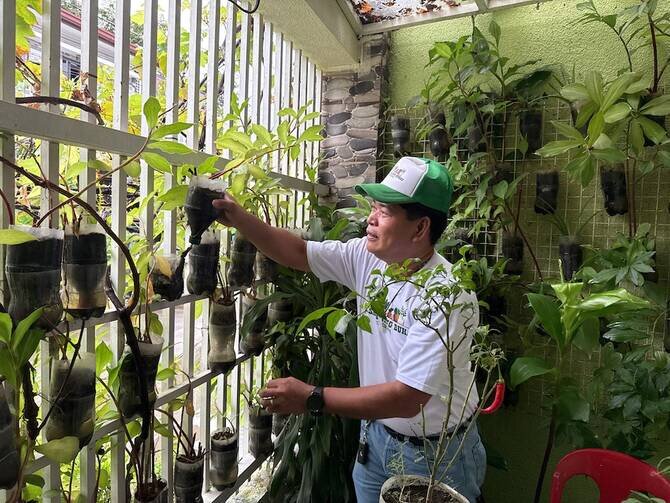
Filipinos turn to urban farming as food prices soar in Manila
Residents of the Philippine capital city are taking matters into their own hands by turning rooftops and backyards into green pockets of harvest.
In Manila, Filipinos have been forced to seek alternative means of acquiring affordable and nutritious food as rising food prices become a pressing issue.
Urban farming has emerged as one solution, with many residents transforming their living spaces into mini farms to combat the problem.
Food inflation in the Manila capital region rose to 3.9 percent in August 2025, nearly double the 2 percent recorded in the same month last year.
Specific food items such as vegetables and cooking bananas saw an even sharper increase of 26.5 percent.
Louie Gutierrez is one such resident who turned to urban farming during the COVID-19 pandemic.
He now leads Urban Farmers PH, an advocacy group that aims to establish farms in every city in the Philippines.
Through his efforts, thousands have been inspired to start their own urban farming projects.
Gutierrez emphasizes the affordability and accessibility of urban farming, utilizing recycled materials for the farm's infrastructure.
The practice allows residents to grow their own pesticide-free vegetables, providing a sustainable solution to food shortages.
For Manila-based journalist Mer Layson, who grew up on a farm, urban gardening offers numerous benefits, including financial savings and better nutrition.
He encourages others to embrace this method of growing their own food, emphasizing that even small containers can be used to cultivate plants.
Urban farming is becoming increasingly popular as Filipinos face rising food prices and the challenge of accessing affordable, nutritious produce.
Urban farming has emerged as one solution, with many residents transforming their living spaces into mini farms to combat the problem.
Food inflation in the Manila capital region rose to 3.9 percent in August 2025, nearly double the 2 percent recorded in the same month last year.
Specific food items such as vegetables and cooking bananas saw an even sharper increase of 26.5 percent.
Louie Gutierrez is one such resident who turned to urban farming during the COVID-19 pandemic.
He now leads Urban Farmers PH, an advocacy group that aims to establish farms in every city in the Philippines.
Through his efforts, thousands have been inspired to start their own urban farming projects.
Gutierrez emphasizes the affordability and accessibility of urban farming, utilizing recycled materials for the farm's infrastructure.
The practice allows residents to grow their own pesticide-free vegetables, providing a sustainable solution to food shortages.
For Manila-based journalist Mer Layson, who grew up on a farm, urban gardening offers numerous benefits, including financial savings and better nutrition.
He encourages others to embrace this method of growing their own food, emphasizing that even small containers can be used to cultivate plants.
Urban farming is becoming increasingly popular as Filipinos face rising food prices and the challenge of accessing affordable, nutritious produce.











